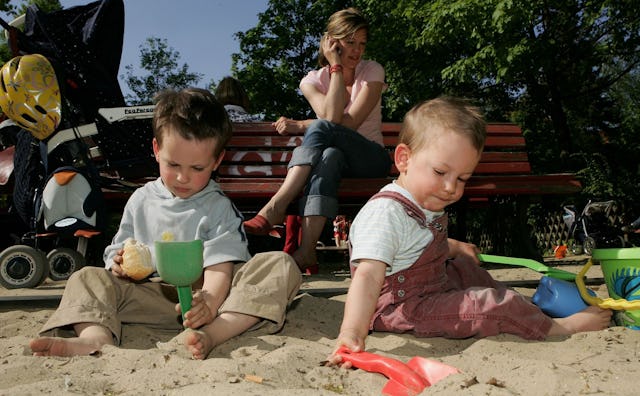Why Is It Important to Talk to Your Kids?

Life is an accumulation of experiences. As adults, we have so many reference points in our daily lives that we often blend them together—we forget where we parked the car, left our sunglasses, even what we ate for breakfast. We’ve become such experts at going about the world that routine events don’t stand out to us.
For the youngest people on Earth—namely babies—their lives are just beginning, and they have significantly fewer experiences to build on. They are slowly learning regularities about their environments (bedtime routines, recognizing Grandma, moving their limbs effectively), but it’s much harder for them to navigate the world with confidence.
Of course, much of this pace is natural to the relative slowness of human development, but within this early window of time, babies’ life experiences can vary greatly. This is where the early influence of language can have profound effects.
© brandon king/flickr
A monumental study (and fascinating book!) by developmental psychologists Betty Hart and Todd Risley in the mid-1990s investigated what factors help children learn words faster. They followed individual children over the course of three years and recorded what kinds of things their parents said to them during everyday activities like meals or playtime.
They found that striking differences emerge in line with families’ socioeconomic status (SES). By age three, children from high-SES, professional families had vocabularies more than double the size of the vocabularies of children from low-SES, welfare families. They also said (on average) twice as many words, as well as twice as many different words, as low-SES children …every hour.
But these differences were not due to education or income level per se. Rather, the researchers found that the biggest predictor of learning words was hearing words: Children whose parents talked to them more had faster language development than children whose parents talked to them less. And high-SES families talked to their children substantially more than lower-SES families did.
By age three, a child from a high-SES family is estimated to have heard over 30 million more words than a child from a low-SES family. This means that a child on welfare may have 30 million fewer opportunities to learn about words and how they’re used.
© dolanh/flickr
There are a few ways these early trajectories snowball into such substantial differences. One is simply that learning takes time and practice, and an opportunity gap puts children who hear less language at a disadvantage compared to their peers who get more experience. Imagine it takes a child a few times hearing “spatula” before committing it to memory. Jamie, who hears “spatula” often—”Here’s the spatula to flip the pancakes,” “The cookies are hot so let’s use the spatula,” “Help me wash the spatula in the sink”—is likely to learn this word faster than Jackie, who sees the tool used just as often but without hearing the name—”Time to flip the pancakes,” “I’m moving the cookies,” “Help me wash the dishes.” Hearing more words, more often, helps children accumulate experiences to solidify their comprehension more efficiently.
Another driver of developmental differences is speed of comprehension. Children understand words faster the more familiar those words are. Their ability to, for example, “Look at the dog” and find the right picture becomes faster with age, indicating that they’re learning to recognize and react to information more efficiently. But in addition to the effect of age, children who hear more speech at home process words faster than peers who hear less speech. Critically, the ability to process words faster frees up more time to learn additional words. In fact, longitudinal work finds associations between comprehension speed at age two and language skills at age eight. Peers who take longer to process information lose the new opportunities for learning that the faster comprehenders gain.
Although children may hear lots of language around them, certain sources are more beneficial than others. In particular, the more children are talked to, the faster they learn new words. Children don’t always tune in to language that’s not directed at them, so they may not pick up on information conveyed to adults or other recipients. Similarly, television and videos are ineffective mediums for teaching children vocabulary. Children learn most effectively from their direct experiences with other people.
© gfpeck/flickr
Hearing people talk is one of the most important ways children learn about the world—both for learning language in itself and acquiring the cultural knowledge that language conveys. Language is not acquired in isolation, and we create the environments in which children learn. In order to create the most valuable experiences for children, we can consider the content and frequency of opportunities we provide to them to support their learning.
While developmental variability in word learning is normal and expected—every child is an individual and learns at his or her own pace—we can try to use our knowledge of these cascading effects to understand how to set the wheels in motion. Of course it isn’t reasonable or sensible to talk to children all the time—children have many equally important things to learn in addition to language—but appreciating the valuable learning opportunities we provide to our children just by talking to them may help us set up more children for success.
Photo: Sean Gallup/Getty
This article was originally published on